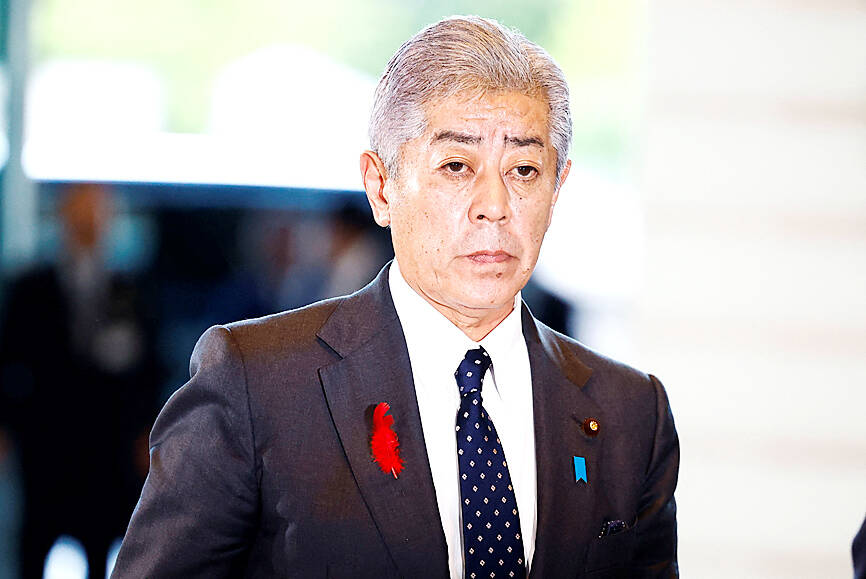Japan’s annual diplomatic report released on Tuesday took aim at the growing security threat posed by the People’s Republic of China (PRC) and reaffirmed the importance of peace and stability across the Taiwan Strait.
The Diplomatic Bluebook 2025, which was presented by Japanese Minister of Foreign Affairs Iwaya Takeshi at a Cabinet meeting, focused on the difficult international situation, including the security environment in East Asia and the PRC’s growing military activity around Japan.
The report noted Beijing’s attempts to unilaterally change by force the “status quo” around the East China Sea, including the Japan-controlled Senkaku Islands, known as the Diaoyutai Islands (釣魚台) in Taiwan, and the South China Sea.

Photo: Reuters
In its latest Diplomatic Bluebook, the Japanese government also expressed serious concern about growing military cooperation between China and Russia, with military aircraft from the two nations both crossing into Japanese airspace last year.
Further south, the PRC conducted “coercive and intimidating maneuvers” in the South China Sea, and carried out military exercises around Taiwan, it said.
Peace and stability in the Taiwan Strait is not only a guarantee for Japan’s security, but also a cornerstone of stability for the international community, it said.
Statements issued at meetings of G7 foreign ministers have also affirmed the importance of peace and stability in the Taiwan Strait and called for the peaceful resolution of cross-strait issues since 2021, it said.
The report also included the joint statement released after a meeting between US President Donald Trump and Japanese Prime Minister Shigeru Ishiba in Washington in February.
“The two leaders emphasized the importance of maintaining peace and stability across the Taiwan Strait as an indispensable element of security and prosperity for the international community,” the joint statement said.
“They encouraged the peaceful resolution of cross-strait issues and opposed any attempts to unilaterally force or coerce changes to the “status quo,” it said.
The Diplomatic Bluebook normally records events from the previous year (the 2025 edition recorded events from January to December last year), but this new edition included important events from early this year, including Ishiba’s meeting with Trump.

The manufacture of the remaining 28 M1A2T Abrams tanks Taiwan purchased from the US has recently been completed, and they are expected to be delivered within the next one to two months, a source said yesterday. The Ministry of National Defense is arranging cargo ships to transport the tanks to Taiwan as soon as possible, said the source, who is familiar with the matter. The estimated arrival time ranges from late this month to early next month, the source said. The 28 Abrams tanks make up the third and final batch of a total of 108 tanks, valued at about NT$40.5 billion

Two Taiwanese prosecutors were questioned by Chinese security personnel at their hotel during a trip to China’s Henan Province this month, the Mainland Affairs Council (MAC) said yesterday. The officers had personal information on the prosecutors, including “when they were assigned to their posts, their work locations and job titles,” MAC Deputy Minister and spokesman Liang Wen-chieh (梁文傑) said. On top of asking about their agencies and positions, the officers also questioned the prosecutors about the Cross-Strait Joint Crime-Fighting and Judicial Mutual Assistance Agreement, a pact that serves as the framework for Taiwan-China cooperation on combating crime and providing judicial assistance, Liang

A group from the Taiwanese Designers in Australia association yesterday represented Taiwan at the Midsumma Pride March in Melbourne. The march, held in the St. Kilda suburb, is the city’s largest LGBTQIA+ parade and the flagship event of the annual Midsumma Festival. It attracted more than 45,000 spectators who supported the 400 groups and 10,000 marchers that participated this year, the association said. Taiwanese Designers said they organized a team to march for Taiwan this year, joining politicians, government agencies, professionals and community organizations in showing support for LGBTQIA+ people and diverse communities. As the first country in Asia to legalize same-sex

MOTIVES QUESTIONED The PLA considers Xi’s policies toward Taiwan to be driven by personal considerations rather than military assessment, the Epoch Times reports Chinese President Xi Jinping’s (習近平) latest purge of the Chinese People’s Liberation Army (PLA) leadership might have been prompted by the military’s opposition to plans of invading Taiwan, the Epoch Times said. The Chinese military opposes waging war against Taiwan by a large consensus, putting it at odds with Xi’s vision, the Falun Gong-affiliated daily said in a report on Thursday, citing anonymous sources with insight into the PLA’s inner workings. The opposition is not the opinion of a few generals, but a widely shared view among the PLA cadre, the Epoch Times cited them as saying. “Chinese forces know full well that